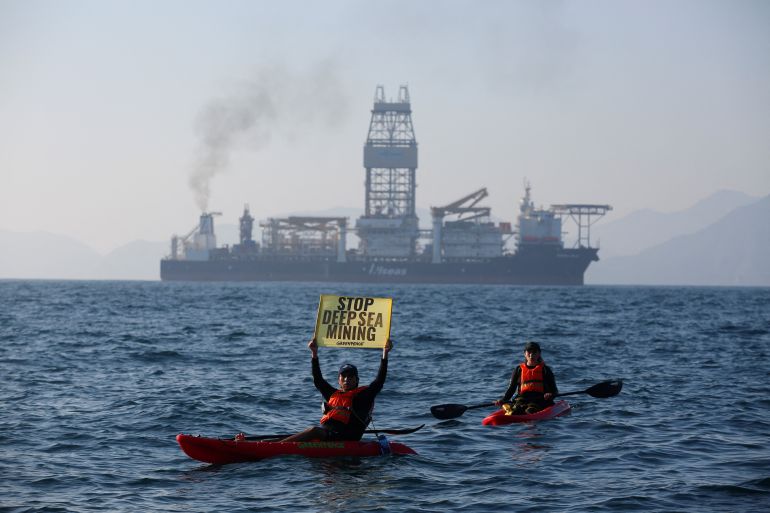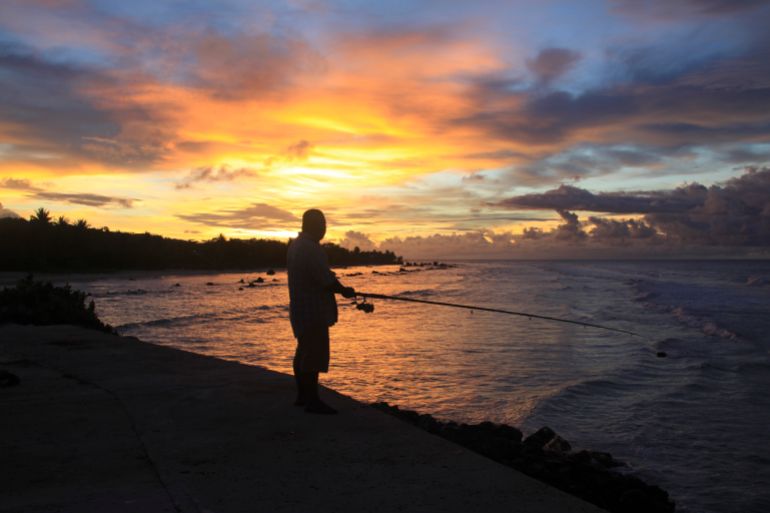Nauru prepares to mine deep seas in big climate controversy
Nauru sees rare earth metals as key to the green transition. But mining them could threaten vital marine ecosystems.

Nauru is a small Pacific island 4,000km (2,485 miles) off the coast of Australia. It is so small, it has no capital city and just one road. But its roughly 12,000 inhabitants are at the heart of a conflict over mining the world’s sea beds for precious minerals.
The clash pits differing views about how to tackle climate change. Nauru’s government sees rare earth metals as a key component in the green energy transition. However, conservationists argue that mining the ocean floor will threaten vital marine ecosystems.
KEEP READING
list of 4 itemsThe road to climate stability runs through us, not SCOTUS
Windfall oil revenue is buying illusory stability in Iraq
What makes South Asia so vulnerable to climate change?
What impact will Threads have on Twitter and social media?
Deep-sea mining involves hoovering poly-metallic nodules – resembling potato-sized nuggets – off the ocean floor and piping them up to vessels on the water’s surface. These nodules contain copper, lithium and other treasured elements.
Advocates for the controversial practice contend that terrestrial mining will soon fall short of the demand for rare earth metals, particularly cobalt and nickel, which are needed to power “green” storage batteries and ensure a shift away from fossil fuels.
According to the International Energy Agency, the surge of battery technology in electric cars, solar panels and wind turbines, resulting from a push to meet the Paris Climate Agreement, will see global mineral demand increase four-fold by 2040.
“The green energy transition will require an enormous amount of storage capacity,” said Jeroen Hagelstein of Allseas, a Swiss subsea contractor. “Metals on the seabed can help meet those needs.”
“Sea mining also leaves a smaller carbon footprint than on land, with fewer impacts on humans,” he said, adding that companies intend to maintain the highest environmental standards and operate within guidelines laid out by regulatory bodies
Environmentalists, however, warn that deep-sea mining poses an existential threat to fragile marine ecosystems. Ancient lifeforms like polychaete worms, dumbo octopuses and twilight zone corals are at risk from dredging.
Deep-water industrial noise would also distort communication between whales, prompting distress and interrupting feeding patterns. Elsewhere, plumes of sediment laced with toxic metals could spiral upwards from seafloor vehicles, contaminating marine food chains.
“Deep-sea habitats are largely unknown. We do know that they take millennia to evolve and can take seconds to destroy. Who knows how long it would take to reestablish dynamic ecosystems once the mining has finished?” asked Jessica Battle, a senior expert on global ocean policy at the World Wide Fund for Nature (WWF).
Environmental groups are not alone in denouncing the practice. In March 2021, BMW, Volvo and Samsung, among others, joined the WWF in calling for a moratorium on deep-sea mining until the ecological risks are better understood.
Today, opponents are mobilising around the International Seabed Authority (ISA) – a United Nations-backed regulator established in 1994 to protect the seabed and regulate mining activities in areas beyond national jurisdictions or in international waters.

Since 2001, the ISA has approved 31 exploration licences. Mining permits, however, have not yet been authorised. That could change this month as Nauru triggered an obscure legal provision two years ago that may allow it to start mining soon.
Under that legal sub-clause in the UN’s Law of the Sea, if a country applies to start deep-sea mining, the ISA has two years to finalise a rulebook for commercial deep-sea mining activities.
If there is no rulebook, mining can start. The loophole expires on July 9. In theory, mining applications can start after that
Over the past 23 months, negotiations have failed to result in a mining code. The ISA may be forced to accept Nauru’s application to start activities this summer (via a subsidiary of The Metals Company, a Canadian firm) even in the absence of industry regulations.
Internal disputes
“Nauru’s application could be provisionally approved,” said Costa Rica’s Permanent Representative to the ISA Gina Guillen Grillo. “Among other requirements, however, it would need to submit an environmental impact statement. Right now, we have no internal process to assess this first step.”
She added that “plenty of member states feel the ISA is under no obligation to approve mining applications until robust regulations with environmental safeguards are in place. And we’re still several years away from that.”
Under existing rules, a mining application must be approved by the ISA’s Legal and Technical Commission (LTC), which then issues recommendations to the body’s ruling council. For a licence to be granted, it would need the support of one-third of the council’s 36 members.
“The council could instruct the LTC not to issue any recommendations before a mining code is established, essentially stopping the process in its tracks bureaucratically,” Ms Guillen Grillo added.
“For now, we continue to work under the principles of consensus and preserving the common heritage of mankind. Decisions about deep-sea mining cannot be rushed to meet some arbitrary deadline,” she said.
Internal disputes are a measure of the tensions hanging over the agency amid pressure from some members to slow down ocean mining, while others want it sped up.
Norway’s government is readying plans to license exploration applications. Chinese vessels, meanwhile, have been prospecting the ocean floor for decades. In contrast, Germany and Costa Rica have advocated for a temporary pause of the practice, citing a lack of scientific impact data.
Looking ahead, Nauru’s actions may prompt other countries to begin applying for licences in July. This has triggered consternation among environmentalists who fear the possibility of a commercial race to the bottom of the ocean.
“Nauru’s legal loophole is small, not big,” said the WWF’s Battle. “We’re hopeful that licences won’t be granted anytime soon and that a moratorium on deep-sea mining will be implemented to help safeguard the health of our seas, rather than use them as a source of short-term profit.”
The government of Nauru’s information office did not respond to multiple requests for comment by Al Jazeera.
SOURCE: AL JAZEERA
Why has a Canadian company partnered with the tiny island of Nauru to fast-track deep-sea mining?
https://plawiuk.blogspot.com/2023/02/why-has-canadian-company-partnered-with.html
A leaked video of ocean pollution during a trial by The Metals Company (TMC) has renewed calls for a ban on deep-sea mining
No comments:
Post a Comment